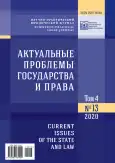Legal aspects of ensuring individual freedom in the religion sphere
- Authors: Meshcheryakova A.F.1
-
Affiliations:
- Penza State University
- Issue: Vol 4, No 13 (2020)
- Pages: 46-58
- Section: General Theory and History of Law and the State
- URL: https://journal-vniispk.ru/2587-9340/article/view/304169
- ID: 304169
Cite item
Abstract
We conduct research on a current problem that is relevant to legal science and practice – ensuring individual freedom in the context of increased interest in religion and the formation of a legal state in Russia. The latter term is considered in connection with such a legal phenomenon as the secular state. We denote the personal rights and freedoms of man and citizen in the religious sphere. We analyze and criticize the current state of freedom of conscience, the right to religious security, and the right of people studying in state and municipal educational institutions and organizations to receive knowledge about religion. It is shown that one of the exercise limits of conscience freedom is its moral criterion. The existing negative decline trends in the level of morality, culture, including legal culture, adversely affect the construction of Russian statehood. It is suggested that in such conditions the inclusion of a course on the foundations of the spiritual and moral culture of the peoples of the Russian Federation in the educational programs of schools and universities is justified. We focus on the requirements for voluntariness and alternative study of the named course. We propose to give them an equal character in terms of legal technology. The connection of freedom of conscience with the right to religious security is shown. In this context, the issue of establishing criminal liability for insulting the religious feelings of believing citizens is analyzed. We point out that with all the doubtful language used by the legislator to set for the disposition of the corresponding article of the Criminal Code of the Russian Federation, the enormous social significance of the amendments cannot be denied.
About the authors
Anna Fedorovna Meshcheryakova
Penza State University
Author for correspondence.
Email: fuga9@yandex.ru
ORCID iD: 0000-0002-7829-8906
Candidate of Jurisrudence, Associate Professor, Associate Professor of Justice Department
Russian Federation, 40 Krasnaya St., Penza 440026, Russian FederationReferences
- Ebzeyev B.S. Lichnost’ i gosudarstvo v Rossii: vzaimnaya otvetstvennost’ i konstitutsion-nyye obyazannosti [Person and State in Russia: Mutual Responsibility and Constitutional Duties]. Moscow, Norma Publ., 2007, 383 p. (In Russian).
- Meshcheryakova A.F. Svoboda sovesti kak dukhovnaya osnova grazhdanskogo obsh-chestva [Freedom of conscience as the spiritual foundation of civil society]. Problemy i perspektivy stanovleniya grazhdansko-pravovogo obshchestva: sbornik statey po itogam Mezhdunarodnoy nauchno-prakticheskoy konferentsii [Problems and Prospects of the Development of Civil Law Society. Digest of Articles Based on the Results of the International Scientific and Practical Conference.]. Sterlitamak, International Research Agency, 2019, pp. 11-12. (In Russian).
- Akchurin T.F. Pravo na svobodu sovesti: mezhdunarodno-pravovoy aspekt [The right to the freedom of conscience: an international law aspect]. Rossiyskoye pravo onlayn – Russian Law Online, 2018, no. 3, pp. 19-28. (In Russian).
- Dvorzhanskiy A.I. Istoriya Penzenskoy eparkhii. Kniga pervaya: Istoricheskiy ocherk [His-tory of Penza Diocese. Book I. Historical Review]. Penza, Publishing and Printing Complex “Penzenskaya Pravda”, 1999, 512 p. (In Russian).
- Nikolayev B.V. Verkhovnyy Sud, religiya i obrazovaniye v SSHA [Supreme Court, religion, and education in the USA]. Gosudarstvo i pravo – State and Law, 2013, no. 2, pp. 96-103. (In Russian).
- Cherkasov K.V., Ivanova O.S., Chalykh I.S. Modeli gosudarstvennogo regulirovaniya reli-gioznogo komponenta obshchego obrazovaniya: rossiyskiy i zarubezhnyy opyt [Models of government regulations of the religious component in general education: Russian and international practices]. Vestnik Tomskogo gosudarstvennogo universiteta – Tomsk State University Journal, 2019, no. 442, pp. 237-247. (In Russian).
- Kostyukova T.A. Modeli vzaimodeystviya svetskogo i religioznogo v obrazovanii: mi-rovoy opyt [Models of interaction of secular and religious in education: world experience]. Sibirskiy pedagogicheskiy zhurnal – Siberian Pedagogical Journal, 2019, no. 5, pp. 103-108. (In Russian).
- Zhamurzov I.A. Ugolovno-pravovaya okhrana svobody sovesti i veroispovedaniya i print-sip ravenstva prav i svobod cheloveka i grazhdanina [Criminal legal protection of freedom of conscience and religion and the principle of equality of human and civil rights and free-doms]. Teoriya i praktika obshchestvennogo razvitiya – Theory and Practice of Social Development, 2019, no. 6 (136), pp. 71-73. (In Russian).
- Lipchanskaya M.A. Svetskoye gosudarstvo v sovremennoy Rossii kak faktor obespeche-niya natsional’noy bezopasnosti [A secular state in modern Russia as a factor of national security]. Vestnik Povolzhskogo instituta upravleniya – The Bulletin of The Volga Region Institute of Administration, 2016, no. 1 (52). pp. 4-9. (In Russian).
Supplementary files








